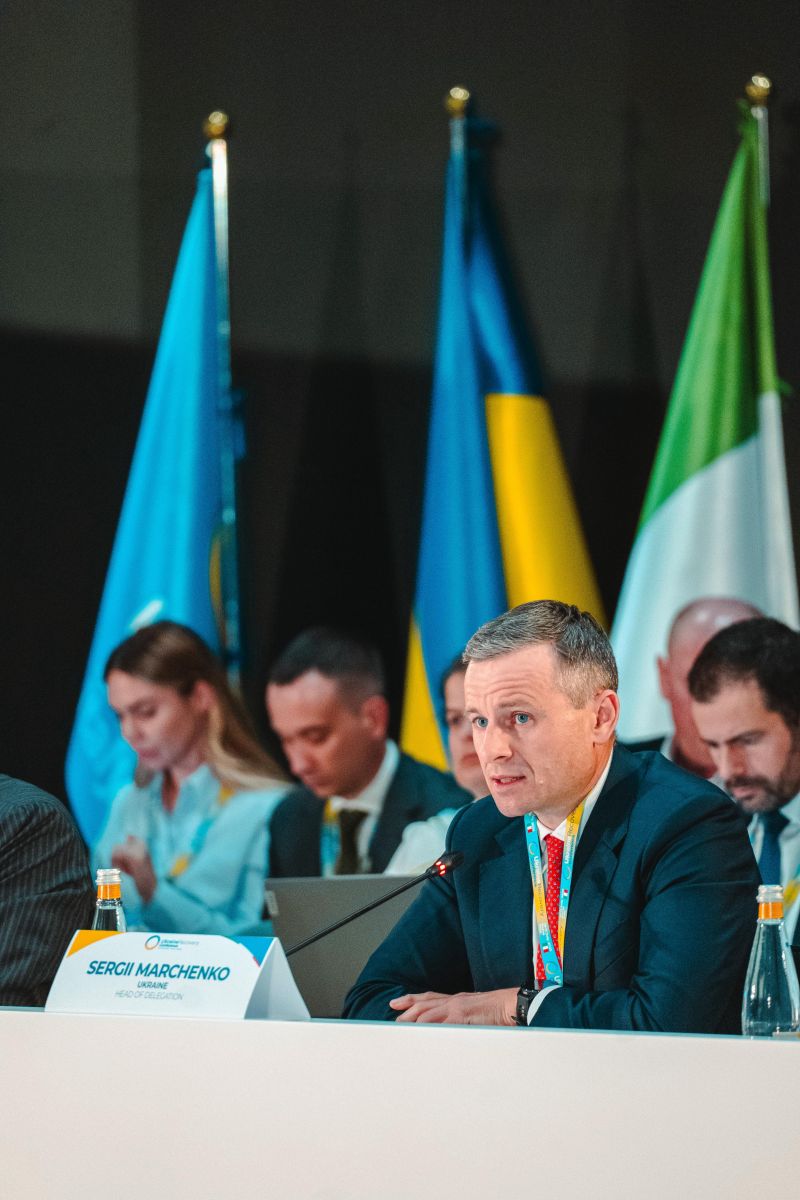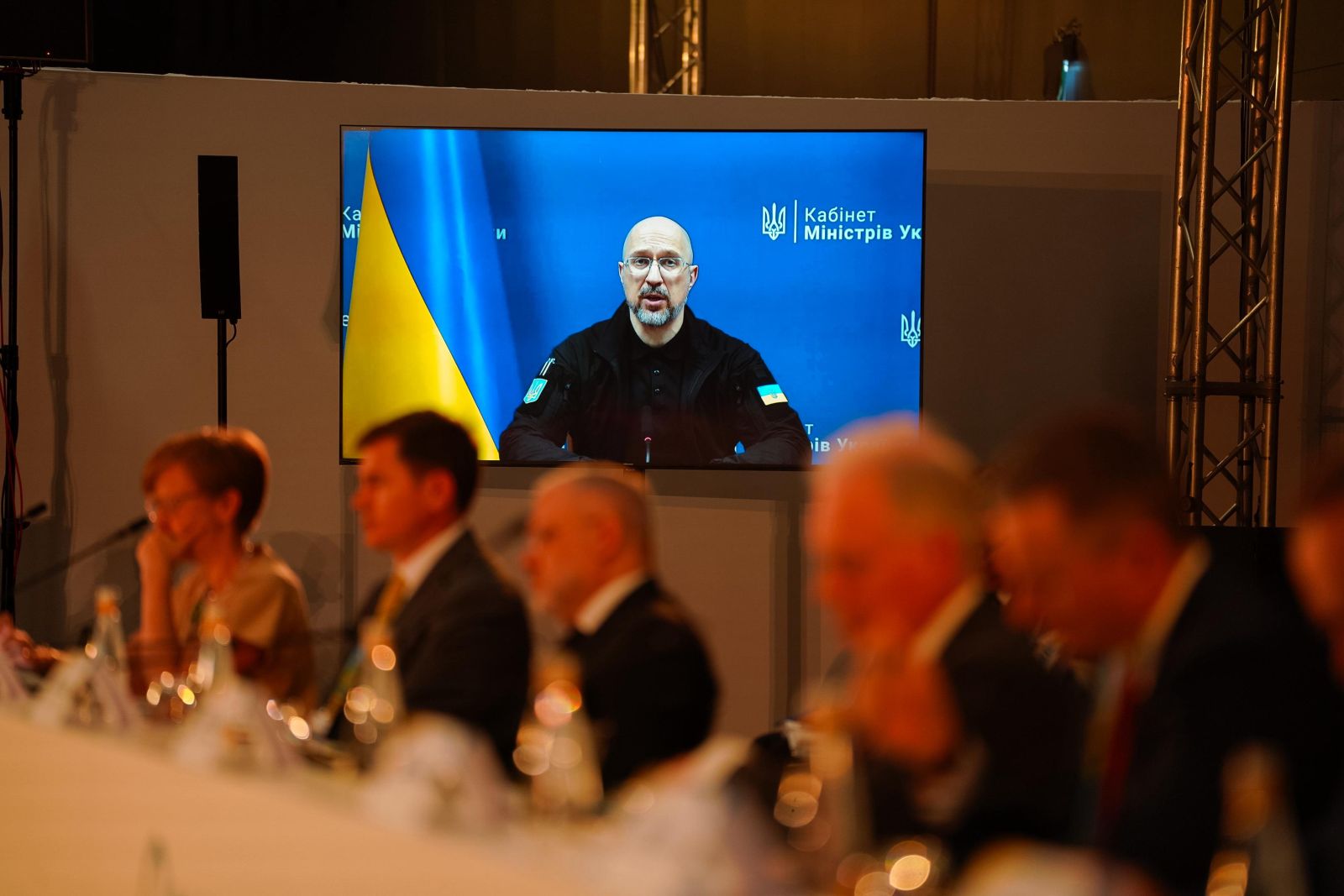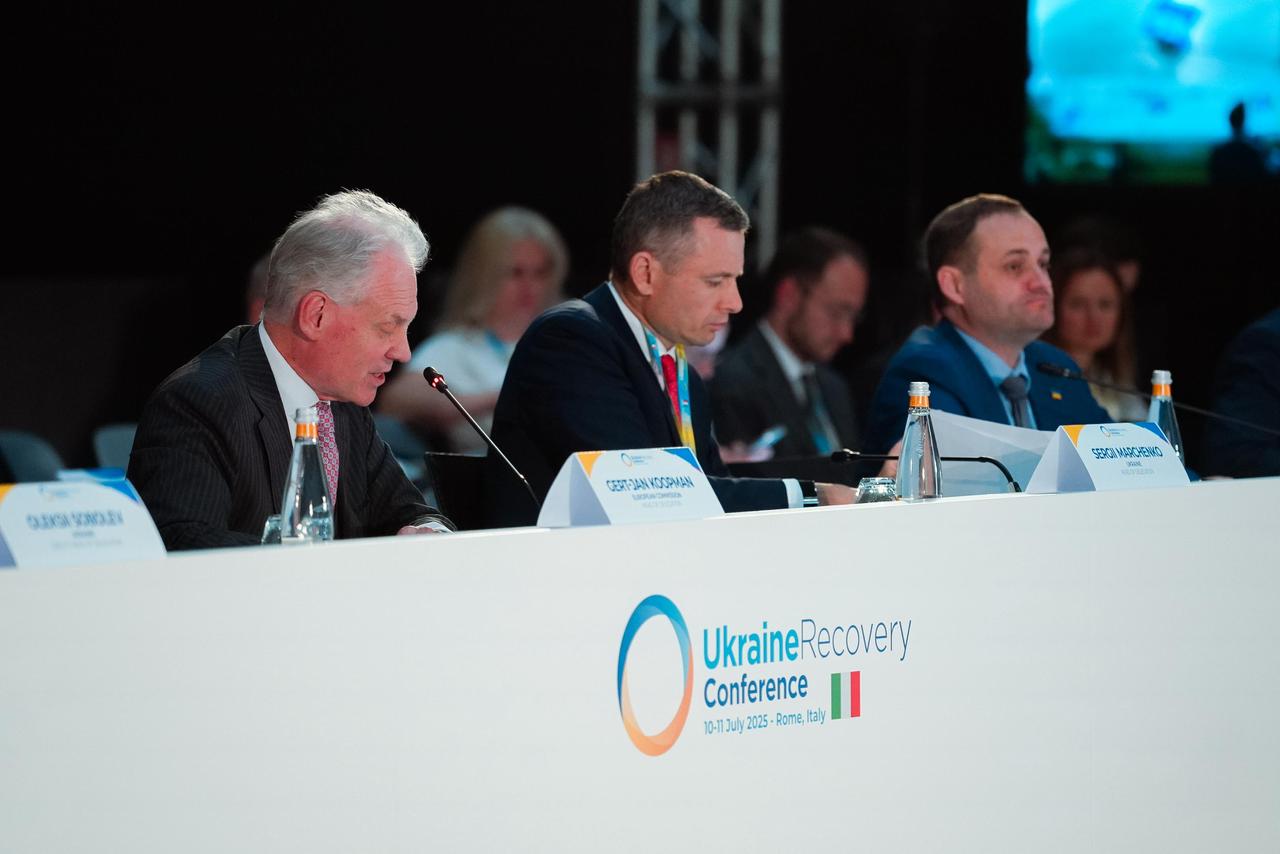Sergii Marchenko outlined Ukraine’s financial needs for 2026 at the meeting of the Ukraine Donor Platform in Rome
-
About Ministry
- Recruitment
-
Accountable agencies
-
State Enterprises and Institutions Belonging to the Sphere of Management of the Ministry
- State enterprise "Management for the operation of the property complex"
- SERVICE AND PUBLISHING CENTR
- Central Treasury sample control enterprise
- Eastern state-owned enterprise of sampling control
- Western state-owned enterprise screening control
- Southern state enterprise of sampling control
- Dnipropetrovsk state-owned enterprise of sampling control
- State enterprise Kyiv offset factory
- State Service for Financial Monitoring
- State Treasury
- The State Audit Service of Ukraine
- State Tax Service of Ukraine
- State Customs Service of Ukraine
- Personnel Audit Procedures of State Customs Service
- State Tax University
-
State Enterprises and Institutions Belonging to the Sphere of Management of the Ministry
- Minfin Panel
-
Policy Issues
- Budget policy
- Tax Policy
-
Customs Policy
-
Integration of customs legislation into EU law
- Direct and indirect customs representation: possible scenarios for declaring goods and the role of a customs broker
- Customs representative and customs holder: who submits and signs documents
- Confirmation of the reliability of credentials for obtaining authorizations
- Authorization to carry out customs brokerage activities
- Integration of customs IT systems to MASP-C
-
Integration of customs legislation into EU law
-
Accounting and Auditing
-
Accounting
-
Introduction of International Financial Reporting Standards
- Translation of International Financial Reporting Standards 2025 (to be completed)
- Translation of international financial reporting standards of 2024
- Translation of international financial reporting standards of 2023
- Translation of the 2022 International Financial Reporting Standards and the Conceptual Framework for Financial Reporting
- Archive of translations
- Taxonomy
- Translation of technical publications
- General Clarifications (filled in after the preparation of the relevant letters of explanation)
- Accounting in Private Sector
- Accounting in the Public Sector
- Methodological Accounting Council under the Ministry of Finance of Ukraine (download a short description)
- IFRS Council under the Ministry of Finance of Ukraine (download a short description)
-
Introduction of International Financial Reporting Standards
- Auditing
- Sustainability reporting
-
Accounting
-
Debt policy
- Overview
- Debt News
- Debt Statistics
- Domestic Bonds
- Primary Dealers
- Eurobonds
- Credit Rating
- Investor Relations
- DMO Awards
- Anti-money laundering policy (AML)
- Financial Policy
- National revenue strategy
-
International Cooperation
- Partners
-
Cooperation in Attracting Financing from the International Financial Institutions
- Development Bank of the Council of Europe
- Procedure for attracting funds of International Financial Institutions
- World Bank
- EBRD
- EIB
- Deutsche Gesellschaft für Internationale Zusammenarbeit (GIZ) GmbH
- KFW
- Register of Joint IFIs Projects at the Stage of Preparation and Implementation (information)
- International Technical Assistance (within the competence of the Ministry of Finance)
- Monitoring of international technical assistance projects
- Cooperation with the Development Partners
- International Tax Relations
- Development of Public Internal Financial Control (PIFC)
-
Public investment management
- Regulatory documents
- Implementation of the roadmap for reforming the management of public investments
- Unified portfolio of public investment projects (list of priority public investment projects)
- Interdepartmental working group on reforming the public investment management system
- Reference information
-
Other Areas of Public Policy
- Internal Audit
- Audit Committee of the Ministry of Finance of Ukraine
- Scientific and scientific and technical activity
- Reform Support Team at the Ministry of Finance of Ukraine
- Verification of State Social Payments
-
Fiscal Risks Managament
- Clarifications
- Legislation on Fiscal Risks Management
- List of Economic Entities with which Major Fiscal Risks May Be Related
- Reports
- List of business entities to which the Ministry of Finance approves proposals for individual financial indicators for the planning period, as well as proposals for maximum thresholds for the volume of capital investments
- Operations with precious stones and metals
- Licensing
- Public Finance Management Strategy (PFMS)
- Strategic Plan
-
Legislation
-
Regulatory Activity
- Reports on tracking the effectiveness of regulatory acts in 2025.
- Activity plan of the Ministry of Finance of Ukraine for project preparation regulatory acts in 2025
- reports_on_the_effectiveness_of_regulatory_acts_2024
- The activity plan for the preparation of the regulatory acts draft 2024
- Schedule of measures to monitor the effectiveness of regulatory acts 2024
- reports_on_the_effectiveness_of_regulatory_acts_2023
- The activity plan for the preparation of the regulatory acts draft 2022
- Schedule of measures to monitor the effectiveness of regulatory acts 2023
- Reports on the effectiveness of regulatory acts 2022
- The activity plan for the preparation of the regulatory acts draft 2022
- Schedule of measures to monitor the effectiveness of regulatory acts 2022
- Reports on the effectiveness of regulatory acts 2020
- The activity plan for the preparation of the regulatory acts draft 2021
- Schedule of measures to monitor the effectiveness of regulatory acts 2021
- Reports on the effectiveness of regulatory acts 2020
- The activity plan for the preparation of the regulatory acts draft 2020
- Schedule of measures to monitor the effectiveness of regulatory acts 2020
- Reports on the effectiveness of regulatory acts 2019
- The activity plan for the preparation of the regulatory acts draft 2019
- Schedule of measures to monitor the effectiveness of regulatory acts 2019
- Reports on the effectiveness of regulatory acts 2018
- The activity plan for the preparation of the regulatory acts draft 2018
- Schedule of measures to monitor the effectiveness of regulatory acts 2018
- Reports on the effectiveness of regulatory acts 2017
- The activity plan for the preparation of the regulatory acts draft 2017
- Schedule of measures to monitor the effectiveness of regulatory acts 2017
- Reports on the effectiveness of regulatory acts 2016
- The activity plan for the preparation of the regulatory acts draft 2016
- Schedule of measures to monitor the effectiveness of regulatory acts 2016
- Reports on the effectiveness of regulatory acts 2015
- The activity plan for the preparation of the regulatory acts draft 2015
-
Draft Regulatory Acts Discussion
- Draft regulatory acts for discussion in 2025.
- Regulatory acts draft for discussion 2024
- Regulatory acts draft for discussion 2023
- Regulatory acts draft for discussion 2022
- Regulatory acts draft for discussion 2021
- Regulatory acts draft for discussion 2020
- Regulatory acts draft for discussion 2019
- Regulatory acts draft for discussion 2018
- Regulatory acts draft for discussion 2017
- Regulatory acts draft for discussion 2016
- Regulatory acts draft for discussion 2015
- Draft Legislation
-
Regulatory Activity
-
Data
- Cooperation with Civil Society
- Press Center
On July 9, the 14th meeting of the Steering Committee of the Ukraine Donor Platform took place in Rome, Italy.
The Ukrainian delegation included Prime Minister Denys Shmyhal (who joined online), Platform Co-Chair and Minister of Finance Sergii Marchenko, Deputy Prime Minister for Restoration of Ukraine, Minister for Development of Communities and Territories of Ukraine Oleksii Kuleba, Minister of Energy German Galushchenko, First Deputy Minister of Economy Oleksii Sobolev.
Among international partners were Director-General for Neighbourhood and Enlargement Negotiations at the European Commission Gert Jan Koopman, Acting Coordinator of U.S. Assistance to Europe, Eurasia and Central Asia at the U.S. Department of State Christopher Berghaus, Special Envoy of the Minister of Foreign Affairs and International Cooperation of the Republic of Italy for the Reconstruction and Resilience of Ukraine Davide La Cecilia, as well as representatives of the G7 countries, the European Commission, and international financial institutions.
Sergii Marchenko expressed gratitude to his counterparts for their active cooperation within the Platform and thanked the Italian side for hosting the in-person meeting in Rome on the sidelines of the Ukraine Recovery Conference.
The Platform remains a key coordination mechanism for international support directed toward budgetary needs and recovery efforts. It currently brings together 23 countries and 7 international financial institutions.
During the meeting, the Minister of Finance outlined the current state of Ukraine’s financial system and its key needs for 2026 and the medium term:
“As a result of the joint efforts of the Ukrainian Government and international partners, Ukraine expects full coverage of its external financing needs for 2025 – amounting to USD 39.3 billion. Over USD 22 billion has already been disbursed in the first half of the year. In the context of both the ongoing full-scale war and a possible scenario of active combat coming to an end, Ukraine requires consistent and predictable external support to maintain financial stability – achieved in close cooperation with partners since 2022. This is also the foundation for the country’s successful recovery.”
According to the IMF’s Extended Fund Facility (EFF) program, in the event of an end to active hostilities, Ukraine’s international financing needs for 2026 would amount to USD 22 billion. At the same time, Ukraine would require additional resources to enhance its defense capabilities. If the full-scale war continues into 2026, budgetary needs will remain at least at the same level as in 2025. Security assistance will not only help deter the aggressor effectively within Ukraine but also serve as a reliable safeguard for Europe against russian threats.
The Minister of Finance urged partners to accelerate efforts to confiscate frozen russian assets. He emphasized that this should not only be a matter of justice but also a significant financial resource for reconstruction.
He also noted the positive trend in domestic revenues. In the first half of 2025, they increased by 17% compared to the same period in 2024.
In 2025, 64% of total expenditures from the general fund of the State Budget have been allocated to the defense sector. The Government has also submitted to Parliament a draft law proposing an additional USD 10 billion (UAH 412.4 billion) in defense funding, sourced from overperformance of revenues and domestic borrowing. These funds are intended to meet the additional needs of the Defense Forces for weapons, ammunition, and equipment.
Special attention was given to the progress of reforms in Ukraine. The Government continues to implement them and fulfill its commitments under cooperation with international partners. Ukraine recently completed the eighth review of the IMF’s EFF program – a record milestone. Significant progress was also made in meeting the conditions for disbursement under the EU’s Ukraine Facility.
Among key achievements is the implementation of the Public Investment Management (PIM) reform, aimed at improving the efficiency and transparency of public expenditures for recovery. The reform introduces new approaches to project selection for public investment.
Sergii Marchenko stressed that current capital expenditures under the PIM reform are focused primarily on urgent needs – housing, energy, and security infrastructure. At the same time, it is important to scale up investment in economic and social development, which will shape the country’s future.
Platform participants reaffirmed their continued commitment to supporting Ukraine in maintaining financial stability, advancing recovery, and achieving sustainable development.


